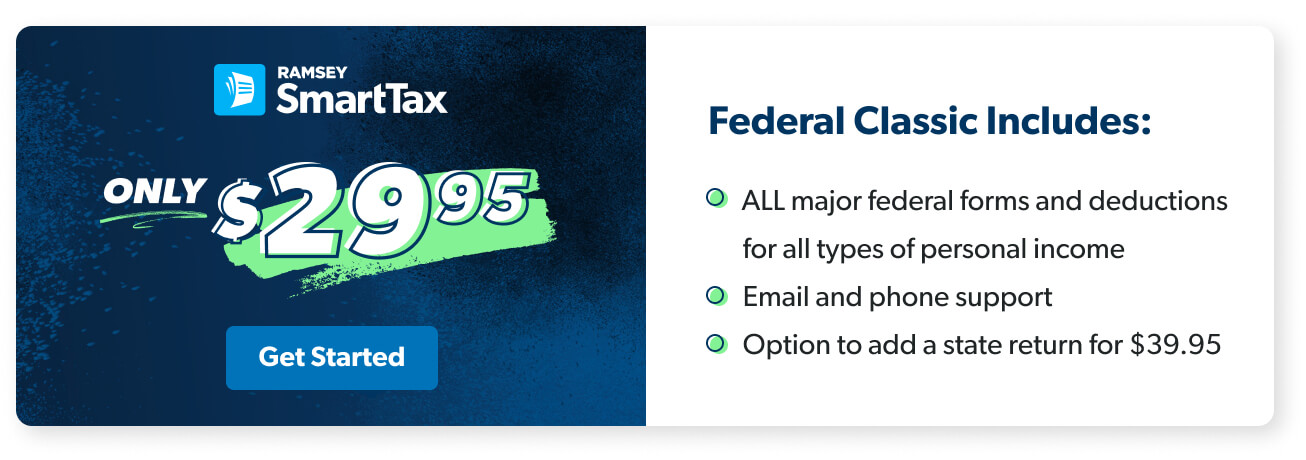Key Takeaways
- The earned income tax credit (EITC) is a refundable credit that helps low- to middle-income workers lower their tax bill or boost their refund.
- For the 2025 tax year, the credit ranges from $649 to $8,046 based on your income, filing status and how many kids you have.1
- To qualify, your income has to be under certain limits, and your investment income must be $11,950 or less.2
- Qualifying income includes wages, self-employment income and long-term disability before retirement age—while unemployment, child support and Social Security don’t count.
Unless you’ve been stranded on a desert island for the last few years, you know inflation is really putting a strain on our wallets.
With grocery prices going through the roof and Uncle Sam demanding we pay our fair share, who wouldn’t like to save a few more bucks during tax season? That’s why you should always take advantage of any tax credits that’ll lower your tax bill . . . and the earned income tax credit (EITC) might be one of them.
A lot of people miss this tax break because they don’t realize they qualify for it, but could the EITC help you and your family save on your taxes this year? Let’s discuss the details and see if you’re eligible for this credit.
What Is the Earned Income Tax Credit (EITC)?
The earned income tax credit is a refundable tax credit designed to help out low- and middle-income workers. If you qualify, you can use the credit to reduce how much tax you owe or increase the amount of your refund.
For the 2025 tax year, the EITC can be anywhere from $649 to $8,046.3 Exactly how much you qualify for—and whether you qualify at all—mainly depends on three things: your income, your filing status, and how many dependents you claim.
How Does the EITC Work?
As we mentioned above, the earned income tax credit is a refundable tax credit. The key word there is refundable—that means if the credit amount is more than what you owe Uncle Sam, you’ll receive the difference as a refund. Nice!
Qualifying for the EITC and figuring out how much your credit is depends on several factors, like your income, filing status, and how many dependents you have. For example, if your earned income and investment income is above a certain amount, you won’t be able to claim this credit at all. And if you have kids, we have some good news: Taxpayers with children usually get a bigger credit than those who don’t have children.
And that’s just scratching the surface! There’s a lot that goes into who gets what, so let’s dive into that right now.
How Much Is the EITC Worth for the 2025 Tax Year?
Depending on your income, your filing status and number of dependents, the EITC could save you thousands on your taxes. Uncle Sam adjusts the EITC amount each year for inflation, and this year is no different.
Here are the maximum EITC amounts you can get based on your number of qualifying dependents:
Maximum 2025 EITC Amounts
|
Qualifying Dependents |
Maximum Credit Amounts |
|
0 |
$649 |
|
1 |
$4,328 |
|
2 |
$7,152 |
|
3 or more |
$8,0464 |
The EITC puts real money back in people’s pockets. For the 2024 tax year (returns processed in 2025), about 24 million workers and families received nearly $70 billion through the EITC—with an average credit of $2,894.5 Don’t miss out. Let a tax pro walk you through the EITC and other tax breaks you might qualify for to help you save money this tax season.
Who Is Eligible for the EITC?
To qualify for the EITC in the 2025 tax year, a single filer with no children must make no more than $19,104, while the cap for a married couple with three or more children is $68,675. Also keep in mind that if your investment income is greater than $11,950, you cannot claim the EITC.6
Here are the maximum income limits for the earned income tax credit based on filing status and the number of dependents you have:
Maximum 2025 Adjusted Gross Income Limits
|
Dependents Claimed |
Single, Head of Household, Married Filing Separately or Qualifying Surviving Spouse |
Married Filing Jointly |
|
0 |
$19,104 |
$26,214 |
|
1 |
$50,434 |
$57,554 |
|
2 |
$57,310 |
$64,430 |
|
3 or more |
$61,555 |
$68,6757 |
Let’s say you’re a single parent of two qualifying children whose adjusted gross income (AGI) was $50,000. In this case, you would qualify for the EITC because your AGI is below the maximum income limit for a person filing single with two children. The maximum credit amount you could get for 2025 is $7,152.
If you’re married filing jointly with one child and you and your spouse make $57,554 or under combined, you would qualify for a maximum credit amount of $4,328.
Here are a few other qualifying rules to keep in mind:
- Your income from investments must be $11,950 or less in the 2025 tax year.
- You must have a valid Social Security number by the due date of your return (including extensions).
- You must be a U.S. citizen or resident alien all year.
- You must not have to file Form 2555, Foreign Earned Income.8
There are special EITC rules for people who have disability income or who have children with disabilities, as well as clergy and military members.9
Don’t have any kids? No worries! You can still claim the EITC, but there are several additional conditions you need to meet on top of the basic qualifying rules above:
- No one can claim you as a dependent or qualifying child on their tax return.
- You must be at least 25 years old, but under 65 years old. If you and your spouse are filing as married filing jointly without a child, only one spouse needs to meet this age requirement.
- Your main home must have been in the United States for more than half the year.10
What Qualifies as Earned Income?
One of the qualifying rules for the earned income tax credit is . . . wait for it . . . earned income. We see what you did there, Uncle Sam. According to the IRS, here are some examples that count as earned income:
- Wages, salary, or tips
- Money made from self-employment (working as an independent contractor, owning a small business, running a farm, or being a minister)
- Long-term disability benefits received prior to minimum retirement age11
But not all income is earned income. Here are some forms of income that aren’t considered earned income:
- Unemployment benefits
- Interest and dividends
- Pensions or annuities
- Child support
- Pay you got for work while you were in jail or prison
- Social Security benefits
- Alimony payments12
Who Counts as a Qualifying Child for the EITC?
You might still qualify for the EITC if you have no children, but the credit amounts increase with each qualifying child you claim. So, who counts as a qualifying child for the EITC? Let’s break down the eligibility rules:13
Age
Any child you claim must be under age 19 and younger than you at the end of the tax year. But if your child is a full-time student for at least five months of the year, you can claim them as a qualifying child as long as they’re under 24 years old.
If your child is permanently disabled or becomes permanently disabled at any point in the year, there’s no age limit to qualify.
Relationship
To qualify for the EITC, the child must be one of the following:
- Your son, daughter, stepchild, adopted child or foster child
- Your brother, sister, half-sibling or stepsibling
- Your grandchild, niece or nephew
Residency
Little Junior or Sally must live in the same home as you in the U.S. for more than half the year. They’ll also need a Social Security number to qualify.
Joint Return
If your kid files a joint return with someone else to claim any credits (like the EITC) for themselves, then you won’t be able to claim them on your return.
How Do I Claim the EITC?
We’ve got good news and not-so-good news.
The good news? If you qualify for the EITC, claiming it is easy. You’ll need to file a Form 1040, U.S. Individual Income Tax Return.14
If you have a qualifying child, you’ll also need to fill out a Schedule EIC, Earned Income Credit, and attach it to your 1040 form.15 The Schedule EIC is where you’ll provide information about your child (like their name, birthday, Social Security number, and number of months they’ve lived with you) to make sure they qualify. And that’s all you need to do to claim the EITC! Not too complicated, right?
But here’s the not-so-good news: If you claim this credit and it turns out Uncle Sam owes you money back, it may delay your refund. By law, the IRS can’t issue EITC refunds before mid-February.16 Bummer!
File Your Taxes With Confidence
There’s a lot of information to digest when it comes to qualifying for the earned income tax credit. If you still have questions, no worries—reach out to a RamseyTrusted® tax pro and let them walk you through the details. These folks are experts on tax credits and eligibility rules. They’ll help you file with confidence!
And if you’re more of a do-it-yourself guy or gal, we’ve got you covered there too. Ramsey SmartTax is the easy-to-use tax filing software that will help you claim the EITC and any other credits or deductions you qualify for!





